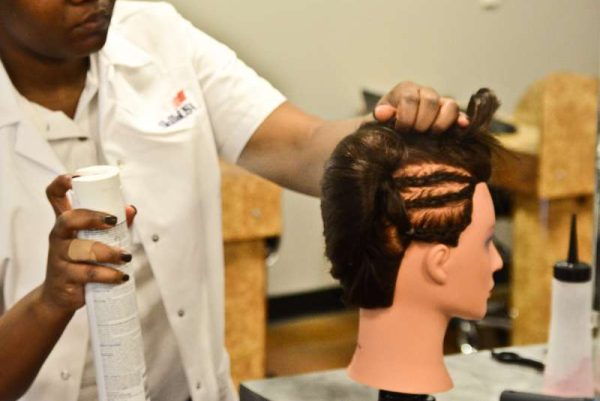Building Foundations for the Future
Texas House Bill changes graduation requirements
Texas House Bill 5 offers different graduation plans based on what the student plans on doing as a career.
Since 2010, high school students in Texas have followed either the Distinguished or Recommended graduation plan as outlined by the state. However, students starting high school in the fall of 2014 are now required to follow the new Foundation High School Program also known as “House Bill 5,” which was passed for the three main objectives of reducing the number of STAAR tests, creating an emphasis on careers and college, and revising school charters.
The Foundation plan requires 26 credits for students to graduate, which includes four credits of English, three credits of math, science and social studies, two credits of foreign language, one of fine arts and physical education each, five elective credits and four additional endorsement credits.
An additional academic change that came with House Bill 5 is the reduction of the number of STAAR End of Course exams required from 15 to five, Algebra I, biology, U.S. history and English I and II. According to San Antonio Express-News, this change also allows students to use satisfactory performance on advanced placement and ACT and SAT exams scores to count toward graduation.
“The reduction is great,” senior Jasmine Nguyen said. “It gives me a lot more time to focus on those five exams instead of spreading my time too thin on all fifteen.”
Under this plan, students are no longer required to take Algebra II. However, students who opt out of taking Algebra II become ineligible for top 10 percent automatic admission into public Texas universities. Students who graduate under the “distinguished” plan, which requires that students complete an endorsement and pass Algebra II, remain eligible for automatic admission.
“I feel it’s better for students to leave high school with an Algebra II credit, so that they can do better in college,” math teacher Angelica Romo-Nease said. “Students might even have to take remedial math after high school to make up for it.”
Although students are still required to take the four core subjects, the Foundation plan allows students to take several different endorsements or electives in a selected area of study. Students chose to focus on the selected path of STEM (Science Technology Engineering Mathematics), business and industry, public service, arts and humanities or multidisciplinary studies.
“There are many certifications you can receive through the career paths we have here, so it really helps [students],” counselor Charley Jo Ivy said. “The younger a student is and the more experience they have, the more likely they are to pick a college major.”
According to Ivy, the Foundation plan allows students to explore options for their future in college.
“Students get to explore all the possibilities better made available to them,” Ivy said. “The program really helps them start to think about the future and what they would like to do with their life.”
Many students have already chosen their new graduation plan. One of the major objectives Texas legislature had in creating the bill was preparing students for future careers in specific fields. For example, students who choose the STEM endorsement can receive an associate degree if they are able to pass the end-of-course exam.
“The state legislature is very much in contact with business leaders,” Ivy said. “So business leaders sometimes inform legislators of what they’re looking for. The more experience you have in a field the more likely you are to get a job.”
While House Bill 5 is relatively new, junior Holly Novak said she believes that the program provides opportunities that can help them achieve success early in life.
“In the new program you get more choices in the classes you can take,” Novak said. “Students should be able to do what they want to do.”
Graduation counselor Ryan Bailey said that the new graduation plan can help pave the way to student success.
“A student who graduates in 2018 or 2019 will have the opportunity to be more qualified in certain areas than a student who graduates now,” Bailey said. “It is an excellent springboard into the workforce.”
According to Bailey, although there are many good things that come from the Foundation plan, it can be a bit overwhelming for students.
“I feel that the program forces students to choose a particular area of study too early in life,” Bailey said. “Most students at this age don’t necessarily know what they want to do.”
To overcome the challenges of choosing a focus, Bailey said he recommends students take an interest inventory.
“Interest inventories are tests used to determine a student’s interests and their plan of best fit,” Bailey said. “It will draw out what you’re interests are as an individual.”
Freshmen Brooklynn Guthery considered her interests and chose public services as her endorsement, taking classes such as Corrective Principles of Public Safety under the Foundation plan.
“I chose public safety because I want to go into the Federal Bureau of Investigation,” Guthery said. “Hopefully, the plan will help me get through college and get a criminal justice degree.”
To fulfill the endorsement requirements and learn the basics of public safety, Guthery is taking classes such as Corrective Principles of Public Safety.
“The plan makes me commit,” Guthery said. “I’m hopeful that it will prepare me and give me the basic needs to get my degree.”
Senior Cindy Wang was a sophomore when the bill passed, and although she chose to continue with the existing plan, she said that she is excited to see how the plan will affect future students.
“This plan is going to be really beneficial to ensuring students are prepared for life after high school,” Wang said. “It is paving the way for the future.”






